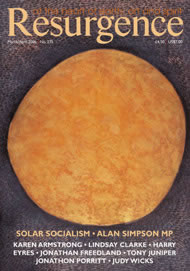ECONOMIC POWER IS based fundamentally on ownership and the possession of property. In the 19th century the anarchist Proudhon declared that “property is theft”, and although I disagree with this sweeping claim I believe there is an element of truth in it.
I would suggest that there are two forms of property – legitimate and illegitimate – and that these are determined by three means of acquisition: work, gift and theft. Legitimate property is obtained through work and gift, whereas illegitimate property is obtained through theft. It is important therefore that we are able to distinguish between work, gift and theft. But it is not a clear-cut issue. We have to rely on definitions through consensus.
‘Work’, whether physical, intellectual or artistic, could be defined as ‘that activity which is socially beneficial and conducted within legal and ethical constraints.’ We then have to define what is meant by ‘socially beneficial’, but the necessity for agreed definitions is important. This is demonstrated for example in the fine distinction made between tax avoidance and tax evasion, between legality and illegality. It is something that is argued back and forth by lawyers and accountants striving to interpret the law.
The distinction between legitimate and illegitimate work will depend on a consensus view. Fraudsters who may expend great effort, skill and diligence in their activities do not ‘work’. Equally the failure of an enterprise may not be due to lack of work. It may be a matter of incompetence. But incompetence, although unfortunate, is not illegal. Initially, the purpose of work is to benefit the individual. But if this work is conducted within legal and ethical standards, then it is also of benefit to society, and this form of work merits reward in the form of material wealth or money.
The acquisition of property by ‘gift’ would appear to be more easily defined. However, where wealth is passed on through inheritance, there is necessarily an ongoing debate, but the situation is monitored by the inheritance tax laws. The system at least is transparent. The giver and the receiver are known.
Where ‘theft’ is concerned a definition is far more problematic. Wealth and power derive mainly through ownership. No matter how hard a person of modest means might work, the resultant increase in his or her overall wealth may be insignificant compared to the increase arising from a slight adjustment in the affairs of a rich person. Whether such adjustment can be described as work is extremely difficult to determine. The rich would generally say that it can, for they may devote a great deal of their time and effort to just such activity, and it is quite apparent that in the world of international finance such adjustments can gain or lose fortunes within seconds. Whether such large-scale financial manipulations are socially beneficial is an open question. They are certainly an established part of economic life. In the pursuit of gain, the production of artefacts or the provision of services cannot compete with the manipulation of wealth. It was well stated by the economist J. K. Galbraith, who said: “It is more advantageous to own things than to make things.”
It is obviously more advantageous to be rich and, having achieved that desirable state, to expend little effort in maintaining it. Whether such effort can be described as work is questionable, for its usefulness is only of benefit to the owners of excessive wealth. The question is whether such ownership is legitimate or illegitimate.
Probably the oldest form of ownership is land ownership; it has bestowed great power and privilege on the owner throughout history and continues to do so. But property in land is probably the most blatant act of theft perpetrated by society on itself. It is stated in such strong terms deliberately, for the whole of society is culpable.
Very few question the validity of property in land; even the dispossessed believe such a concept is legitimate. But a little serious thought shows that legitimate ownership of land is impossible. The land was there before societies existed and will still be there when we and all our works are gone. It could only have become possessed by theft. The term ‘land’ encompasses all the natural wealth of the planet: the oil and minerals in the ground, the natural forests, the fish in the sea. None of this may be ‘owned’. At best we are the trustees, on behalf of all living beings and future generations. If we claim ownership and pollute or destroy the natural fabric of the Earth, we break that trust.
There is no question that all of us need land, but this applies to all equally. Even farmers who cultivate and care for the land have no right of ownership. They have the right to security of tenure and the product of their husbandry. They have a right to sell the value of its fertility for which they have worked, but they are selling the product of their work; they are not selling the land. They are, as we all are, no more than custodians. This is an example of the distinction that must be made between legitimate and illegitimate property, a distinction which has become blurred over time and eventually lost, to the great advantage of landlords and land speculators who have been able to amass great fortunes through land transactions and rents on the spurious claim of ownership. The origins of their ‘ownership’ must have begun with appropriation either by guile or by force, and no amount of subsequent legal ratification can alter that fact.
ANOTHER IMPORTANT FACTOR in the exercise of power through ownership is in the area of shareholding, a cornerstone of the capitalist system. The injustices that arose from absentee ownership of land in the 18th and 19th centuries are reflected in the current system of share ownership, whereby whole industries are owned by shareholders who are largely indifferent towards or ignorant of the nature of the industry they own. Their sole interest is that the return on their shareholding should be profitable. As with the absentee landowners of the past, this represents a form of power without responsibility. However, the system is now entrenched in everyday life; and the buying and selling of shares, regardless of what industry they represent, is carried out on behalf of anyone with a savings account in any institution. We are all absentee owners either directly or indirectly. But we take no responsibility. When enterprises are successful and prosperous, everyone is happy to take a share in the wealth, but when an enterprise runs into difficulties, the shareholders try to sell their shares or complain to the managers they themselves put in place that their profits are down.
Private trade has always been a legitimate activity, the abiding principle being to buy at a low price and sell at a higher price and thereby make a living. The trader makes a profit, and society is served by a facilitation in the access to goods and services. The activity is useful work. But the further removed trade becomes from its original source, the more it is subject to the law of diminishing returns, not only to the trader but to society in general. At some point it forfeits its usefulness. Such is the case in areas of international finance where, in the buying and selling of currencies and high-risk shares, one has the impression of a gambling casino, which in terms of social benefit is completely unproductive. Therefore those who gain a living from neither work nor gift are, by definition, engaged in theft, the consequence of which is social and ecological damage.
IN THE CONTEMPORARY world, poverty is caused by the growth and maintenance of ownership in large concentrations that take from society more than they give. It is a form of theft. Real wealth is produced through the application of real work, and those who have an excess of wealth have gained it through the work of others. In this sense, the act of theft is gradual and insidious but no less real. We see the gradual transition from legitimate to illegitimate property, legitimate to illegitimate power. The primary cause of poverty is an economic system that promotes excessive concentrations of wealth and ownership. Very simply, the fundamental cause of poverty is greed.
I am not arguing for the confiscation of wealth, or even for equality. Self-interest cannot be eliminated by legislation. Attempts to do so in the past have resulted in the imposition of brutal tyrannies. We should concentrate less on equality and more on justice. Justice and fairness should became the guiding principles in our economic affairs.
Economics is not only about production and wealth creation. It is also about morality, and the first moral principle is that the strong owe a duty towards the weak. There are enormous social injustices in the world. Of course, remedial activity is constantly being carried out to alleviate poverty, but it never can get to the root-cause of the problem: the concentration of excessive wealth and the safeguarding of illegitimate property.
Any reform of the situation will require a redefinition of the meanings of ‘work’ and of ‘ownership’. We can only face up to the problem of injustice when we are able to recognise that the ‘ownership’ of land, forests, rivers and all other natural resources is a form of theft. Only when we move from ownership to trusteeship can we create a just society.
The future challenge lies in devising a socio-economic system that is able to distinguish between legitimate and illegitimate property, and that would incorporate incentives to promote work that is socially beneficial and discourage work that is not.







